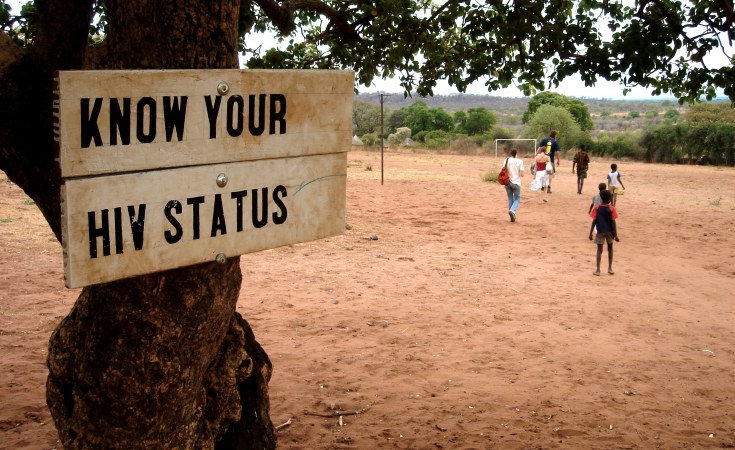Homophobia is not the only motive behind Nigeria's new anti-gay bill. President Goodluck Jonathan is trying to cover up incompetence with hatred.
Before last week, the lot of Nigeria's homosexuals was not to be envied. But on 7 January, embattled president Goodluck Jonathan signed a bill into law that made their situation even worse. Now, in Nigeria, homosexual acts are punishable by a 14-year jail sentence, while aiding gay activism and gay groups is banned.
However, while this bill plays well to a domestic audience, homophobia is not the only motive behind these unsavoury measures. The law is a calculated move to change the focus of the Nigerian political debate at a time when Jonathan's luck appears to be running out.
In his 2011 presidential campaign, Jonathan promised to transform Nigeria's corrupt, oil-dependent and unequal economy into the powerhouse it could be.
He had many of the tools to do it: some impressive ministers, enormous majorities in the National Assembly and the Senate, control over most state governments, and a stable multi-ethnic, multi-confessional party.
But three years on, the government is paralysed by multiple crises - not least, an era-defining split in the ruling People's Democratic Party (PDP) and increased ethnic, religious, and regional tensions. Jonathan even asked his celebrated central bank governor, Sanusi Lamido Sanusi, to resign for daring to speak out against elite corruption.
It seems that as his position weakens, Jonathan is scrambling for a populist measure that will give him the domestic support he so desperately needs. And in a socially conservative society, an anti-gay position might prove enough of a distraction to relieve some pressure.
But the debate over homosexuality in Nigeria, as in some other African countries, is about more than what happens in the bedroom. This bill is designed to stir up anger at an idea of imposed Western values, helping create solidarity at home by directing anger outwards. Why else would the law be presented as an "anti-gay marriage" bill, when few if any local activists were calling for gay marriage?
By signing the bill into law, Jonathan is banking on the idea that an inevitable reproach from the international community will serve as an excellent positive feedback mechanism, giving ground to fears of outside interference in African affairs. This, despite the fact that Nigeria inherited its laws criminalising homosexuality from British colonial rule.
Furthermore, although Western media tends only to pick up on these kinds of stories when something awful happens, this bill itself is not new. Several versions of it have already passed through the National Assembly, and it has, in effect, been sitting in Jonathan's in-tray ready to be deployed when he needs it most for more than two years.
Distraction tactics
With faith and community groups coming out in support of the bill, and a broadly favourable social media buzz, Jonathan can be satisfied with a good response.
The editors of Nigeria's newspapers are still focusing on Jonathan's political difficulties, but growing opprobrium from Western leaders could soon knock these more damaging stories off the front pages.
Unfortunately, homophobia in Nigeria isn't a problem that Western strong-arming can fix. Indeed, a de-contextualised response is only likely to strengthen Jonathan's hand.
Worse, it could incentivise other leaders to follow the example of Uganda's president Yoweri Museveni and Nigeria's Jonathan and drag out anti-gay legislation and sentiment as an easy fix for bad press.
US Secretary of State John Kerry's censure of Nigeria over this bill or UK Prime Minister David Cameron's proposals to tie aid to gay rights sound progressive if you're sitting in London or New York. But that's precisely the point. These statements mostly serve to satisfy a domestic audience, rather engage with LGBTQ activists struggling on the ground in Nigeria for equality.
It is of course important that Western politicians are seen to support gay rights in Nigeria, but some of the ways in which they tend to profess their solidarity belies a lack of understanding of the lived reality of LGBTQ people in oppressive societies.
For example, if the West were to withdraw aid and punish all Nigerians for Jonathan's decision to use hate as a distraction for incompetence, the likelihood is that homosexual communities, for whom life is already dangerous, will become the scapegoats.
More cautious routes are needed. Peter Tatchell, for instance, suggests that governments should look to deliver aid via grassroots organisations that won't discriminate.
Nigeria's most recent abuse of gay rights is particularly perverse because it has been done for grubby political reasons. I suggest that we on the outside undercut Jonathan's feint by highlighting not only the abhorrent content of the bill, but also the motivations behind its passing. Then, perhaps, it won't be so easy for failing leaders to cover up their incompetence with hatred.
A version of this article was also published on Independent Voices.
James Schneider is the Editor-in-Chief of Think Africa Press. He read Theology at the University of Oxford and has a particular interest in the study of political economy, patterns of investment, and perspectives from the Global South.
He is also a frequent commentator on African affairs for Monocle24 radio. Email: editor@thinkafricapress.com. Follow him on twitter @schneiderhome.


